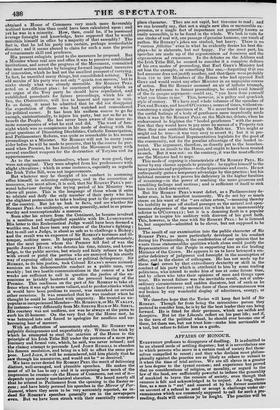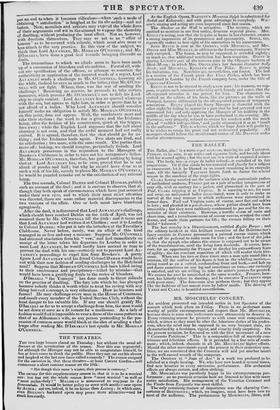AFFAIRS OF HONOUR.
EVERYBODY professes to disapprove of duelling. It is admitted to be an absurd mode of settling disputes; but it is nevertheless one to which persons who move in a certain rank of society feel themselves compelled to resort ; and they who declaim most philosophically against the practice are as likely as others to submit to it when the time of trial arrives. We are all slaves in a greater or less degree to the tyrant custom; and experience has proved that no considerations of religion, or morality, or regard to the law of the land, are sufficiently powerful to induce the generality of mankind to brave the censure of society, even though that censure is felt and acknowledged to be unjust. As long, therefore, as a man is "cut" and sneered at by his former associates on account of a refusal to send or accept a challenge under circumstances which are commonly supposed to call for such a proceeding, dude will continue to be fought. The practice will be
put an end to when it becomes ridiculous—when `such a mode of obtaining " satisfaction'. is laughed at for its abs ardity—and not before. Now moralists and satirists may expeSid the whole force of their arguments and wit in the attempt to capose the absurdity of duelling, without producing the least effect. Not so, however, with duellists themselves. They may so net in an " affair of
honour" as to be covered with ridicule, which must also more or less attach to the very practice. In this view of the sabject, we
think that Lord ALVANLEY, Mr. MORGAN OtosseLt, and Mr. DISRAELI, have done a good deal towards bringing discredit on duels.
The transactions to which we allude seem to have been made sip of a succession of blunders and absurdities. First of all, with out any specification of the offence, or attempt to ascertain the
authenticity or application of the imputed words of a report, Lord ALVANLEY sends a challenge to Mr. O'CONNELL, knowing all
the while, (indeed he says as much in the letter,) that Mr. Otos :NELL will not fight. Where, then, was the use of sending the challenge ? Receiving no answer, he proceeds to take certain measures, which provoke Mr. Mos:vs:Lis son to defy his Lord
ship to single combat. Lord ALVANLEY has no quarrel whatever with the son, but agrees to fight him, in order to prove that he is not afraid of a bullet. Why Lord ALVANLEY should consider himself under an obligation to satisfy Mr. MORGAN OtoarstELL on this point, does not appear. Well, the combatants meet and take their stations : the word to fire is given ; and the Irishman being, after the fashion of his countrymen, quick at the trigger, fires away ; while the English Lord supposes that the talk about shooting is not over, and that the awful moment had not really arrived. It is agreed, therefore, that the shot should go for no thing; and the Irishman loads again. Two shots are fired, and no satisfaction ; two more, with the same result. The parties then
move off; looking, we should imagine, particularly foolish. Lord
ALVANLEY perseveres in the 'requisition to the Managers of Brookes's Clubhouse in order to turn out his antagonist's father.
Mr. MORGAN O'CONNELL, therefore, has gained nothing by being shot at. Lord ALVANLEY has, to be sure, proved that he is not afraid of powder and ball ; but why he should have done so at such a risk of his life, merely to please Mr. MORGAN O'CONNELL, be would be puzzled to make out to the satisfaction of any rational being. The two seconds, Colonel DAMER and Colonel HODGES, publish each an account of the duel ; and it is curious to observe, that al
though they both speak of circumstances which have just occurred under their own eyes, and to which their most strict attention was directed, there are some rather material discrepancies in the two versions of the affair. One or both must have blundered egregiously.
After the duel, it is discovered that Lord ALVANLEVS challenge, which should have reached Dublin on the 24th of April, was not received there by Mr. O'CONNELL till the 29th: and it turns out that Lord ALVANLEY had written it at Cliefden ; sent it to London to Colonel DAMER; who put it into the letterbox at the Traveller's
Clubhouse. Never before, surely, was an affair of this kind managed in so free and easy a manner. Suppose Mr. Oto:ssELL had obtained absolution from his " vow," and had immediately on receipt of the letter taken his departure for London in order to
meet Lord ALVANLEY, he would hardly have arrived in time to prevent the duel with his son—certainly not to prevent Lord AL
vestry's proceedings to expel him from Brookes's. A pretty
figure Lord ALVANLEY and his friend Colonel DAMER would have cut with their new fashion of sending challenges by the Holyhead mail ! Suppose that MORGAN O'CONNELL had been killed owing to their carelessness and precipitancy—killed by mistake—that would have been a gratifying finale to the series of blunders. D'ISRAELI "the Younger" has done much to throw ridicule on the practice of duelling. The fury into which lie has plunged
because nobody thinks it worth while to treat his raving with any thing but cool contempt, is very ridiculous. How he blusters and fumes'! Ile may challenge every man in the House of Commons, and insult every member of the United Service Club, without the least danger to his valuable life. If any one should gratify Mr. DisuitaeLi so far as to accept a challenge from him, the-man would be set down.at onee as a fit inmate for a madhouse. As a lady of fashion would hid it impossible to wear a dress of the same pattern as that of an Alderman's wife, so any person pretending to the pos session of common sense would blush at the idea of sending a challenge after reading Mr. D'Isaisitti's last epistle to Mr. MORGAN O'CONNELL.



























 Previous page
Previous page